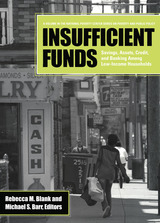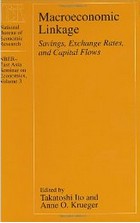3 books about Savings

Insufficient Funds
Savings, Assets, Credit, and Banking Among Low-Income Households
Rebecca M. Blank
Russell Sage Foundation, 2009
One in four American adults doesn’t have a bank account. Low-income families lack access to many of the basic financial services middle-class families take for granted and are particularly susceptible to financial emergencies, unemployment, loss of a home, and uninsured medical problems. Insufficient Funds explores how institutional constraints and individual decisions combine to produce this striking disparity and recommends policies to help alleviate the problem. Mainstream financial services are both less available and more expensive for low-income households. High fees, minimum-balance policies, and the relative scarcity of banks in poor neighborhoods are key factors. Michael Barr reports the results of an in-depth study of financial behavior in 1,000 low- and moderate-income families in metropolitan Detroit. He finds that most poor households have bank accounts, but combine use of mainstream services with alternative options such as money orders, pawnshops, and payday lenders. Barr suggests that a tax credit for banks serving primarily disadvantaged customers could facilitate greater equality in the private financial sector. Drawing on evidence from behavioral economics, Sendhil Mullainathan and Eldar Shafir show that low-income individuals exhibit many of the same patterns and weaknesses in financial decision making as middle-class individuals and could benefit from many of the same financial aids. They argue that savings programs that automatically enroll participants and require them to actively opt out in order to leave the program could drastically increase savings ability. Ronald Mann demonstrates that significant changes in the credit market over the past fifteen years have allowed companies to expand credit to a larger share of low-income families. Mann calls for regulations on credit card companies that would require greater disclosure of actual interest rates and fees. Raphael Bostic and Kwan Lee find that while home ownership has risen dramatically over the past twenty years, elevated risks for low-income families—such as foreclosure—may well outweigh the benefits of owning a home. The authors ultimately argue that if we want to demand financial responsibility from low-income households, we have an obligation to assure that these families have access to the banking, credit, and savings institutions that are readily available to higher-income families. Insufficient Funds highlights where and how access is blocked and shows how government policy and individual decisions could combine to eliminate many of these barriers in the future.
[more]

Macroeconomic Linkage
Savings, Exchange Rates, and Capital Flows
Edited by Takatoshi Ito and Anne O. Krueger
University of Chicago Press, 1994
This volume explores East Asia's macroeconomic experience in the 1980s and the economic impact of East Asia's growth on the rest of the world. The authors explore the causes of capital flows, changes in trade balances, and exchange rate fluctuations in East Asia and their effects on other countries.
These fourteen papers are organized around four themes: the overall determinants of growth and trading relations in the East Asian region; monetary policies in relation to capital controls and capital accounts; the impact of exchange rate behavior on industrial structure; and the potential for greater regional integration. The contributors examine interactions among exchange rate movements, trade balances, and capital flows; how government monetary policy affects capital flows; the effect of exchange rates on industrial structure, inventories, and prices; and the extent of regional integration in East Asia.
These fourteen papers are organized around four themes: the overall determinants of growth and trading relations in the East Asian region; monetary policies in relation to capital controls and capital accounts; the impact of exchange rate behavior on industrial structure; and the potential for greater regional integration. The contributors examine interactions among exchange rate movements, trade balances, and capital flows; how government monetary policy affects capital flows; the effect of exchange rates on industrial structure, inventories, and prices; and the extent of regional integration in East Asia.
[more]

Savings in the Modern Economy
A Symposium
Walter Heller
University of Minnesota Press, 1953
Savings in the Modern Economy was first published in 1953. Minnesota Archive Editions uses digital technology to make long-unavailable books once again accessible, and are published unaltered from the original University of Minnesota Press editions.How will savings affect the future economy of the United States and other parts of the world? Will savings continue to aid economy expansion or will they lead, sooner or later, to difficult problems? What are the motivations that cause people to save? How has the pattern of saving changed in recent times? What is the effect of retirement and pension funds? What is the role of savings in periods of inflation? In economy depression? How can savings foster economy progress in underdeveloped countries?To provide a scholarly yet thoroughly practical basis for answers to questions like these, a group of distinguished economists pool their thinking in this volume. The series of 28 papers bring to the problem varied backgrounds and different viewpoints. Professors, bankers, government officials, and industrialists, representing national and international organizations and business enterprises, contribute papers and related comments. There is not always agreement in the discussion, and no quick and easy solutions are offered, but the resulting analysis is realistic and timely, yet long-range in approach and value.The material covers four broad topics: savings and economic policy; savings concepts, data, and behavior; the savings problem in underdeveloped countries (with specific reference to the Far East and Latin America); and savings and inflation.The volume is based on papers given at a conference on Savings, Inflation, and Economy Progress held at the University of Minnesota through the cooperation of the university’s School of Business Administration and a number of sponsoring business firms.
[more]
READERS
Browse our collection.
PUBLISHERS
See BiblioVault's publisher services.
STUDENT SERVICES
Files for college accessibility offices.
UChicago Accessibility Resources
home | accessibility | search | about | contact us
BiblioVault ® 2001 - 2024
The University of Chicago Press









